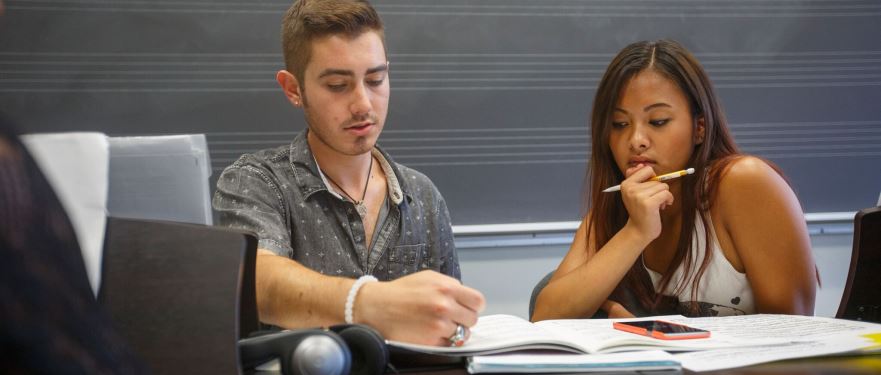Music
What is Music?
LMU's Music major provides quality instruction for students who wish to pursue music as a career or enrich their lives through music study or performance.
The Music major provides a balanced program that includes musicianship, historical perspectives, and musical performance. Students receive individual attention from professors via small classes and private lessons in voice, piano, guitar, strings (violin, viola, cello and double bass) and percussion.
The Department of Music prides itself on its ensembles. The department's large ensembles are the LMU Choruses, Sinatra Opera Workshop, LMU Chamber Orchestra, and World Music Ensembles (West African and Balinese Gamelan). Smaller groups are the String, Guitar and Mixed Chamber ensembles. The highly acclaimed LMU Choruses, made up of the Consort Singers, Women's Chorus and Concert Choir, tour domestically and internationally.
What do Music majors do?
The music curriculum is a rigorous program that combines learning about the structure and story of music with opportunities to perform great music. Music majors develop the physical coordination and technical skills required for specific musical activities, such as vocal and instrumental performance or conducting. Students learn to apply essential principles of music theory and form to the study and evaluation of musical scores. They also develop the creative skills to create their own compositions.
Music majors examine the historical evolution of Western music as evidenced by style periods, performance practices, and representative composers and their works. Majors also study music as a cultural phenomenon, seen in its interrelationship with belief systems, life ways and language.
The music major is organized around the instrumental or vocal emphasis, in which a student undertakes private studies in voice, piano, guitar, strings or percussion. In addition, a student majoring in music also selects a specialized concentration in instrumental/vocal studies (performance), music history, music theory/composition, ethnomusicology, and instrumental/vocal conducting.
Applicants must audition in person or submit a recorded audition (CD). Audition requirements may be obtained from the Music Department's administrative assistant and production coordinator.
Is this major right for you?
You might be a Music major if you:
- Plan to be a professional musician
- Value the power of music
- Love to sing or play piano, guitar, percussion, or strings
- Are interested in music history
- Are disciplined and creative
About our faculty
Faculty members are active performers, composers, conductors, and professional association leaders. They have appeared in concert at Carnegie Hall, the Hollywood Bowl, Walt Disney Concert Hall, and many European concert stages. Their original compositions have been performed at the Kennedy Center for the Performing Arts, Jordan Hall in Boston, and other venues worldwide.
About our students and graduates
Our students receive in-depth private instruction in voice, piano, guitar, strings and percussion. LMU tuition covers four years of private lessons for music majors. Professional accompanists are available free of charge for lessons, auditions, and recital preparation.
LMU students majoring or minoring in Music will be prepared for advanced studies and performance, as well as careers in fields such as musicology, composition, ethnomusicology, music librarianship, and pedagogy-oriented teaching.
Representative courses
Our courses have included:
- Guitar, Percussion, Piano, Strings, Voice
- Music Theory and Form
- Music History
- Instrumentation
- Instrumental and Vocal Conducting
- Instrumental and Vocal Pedagogy
- Topics in World Music Cultures
- Research and Methods in Ethnomusicology
- Tonal Counterpoint
- Music Composition
- Opera Scenes
- Choral Ensembles
- Chamber Orchestra
- Chamber Ensembles
- World Music Ensembles
Music courses for general students have included:
- Lessons in Guitar, Percussion, Piano, Strings, Voice
- Music Fundamentals
- Enjoyment of Music
- The Vocal Experience
- The Guitar Experience
- The Piano Experience
- History of Jazz
- History of Popular Music
- Choral Ensembles
- Chamber Orchestra
- Chamber Ensembles
- World Music Ensembles
